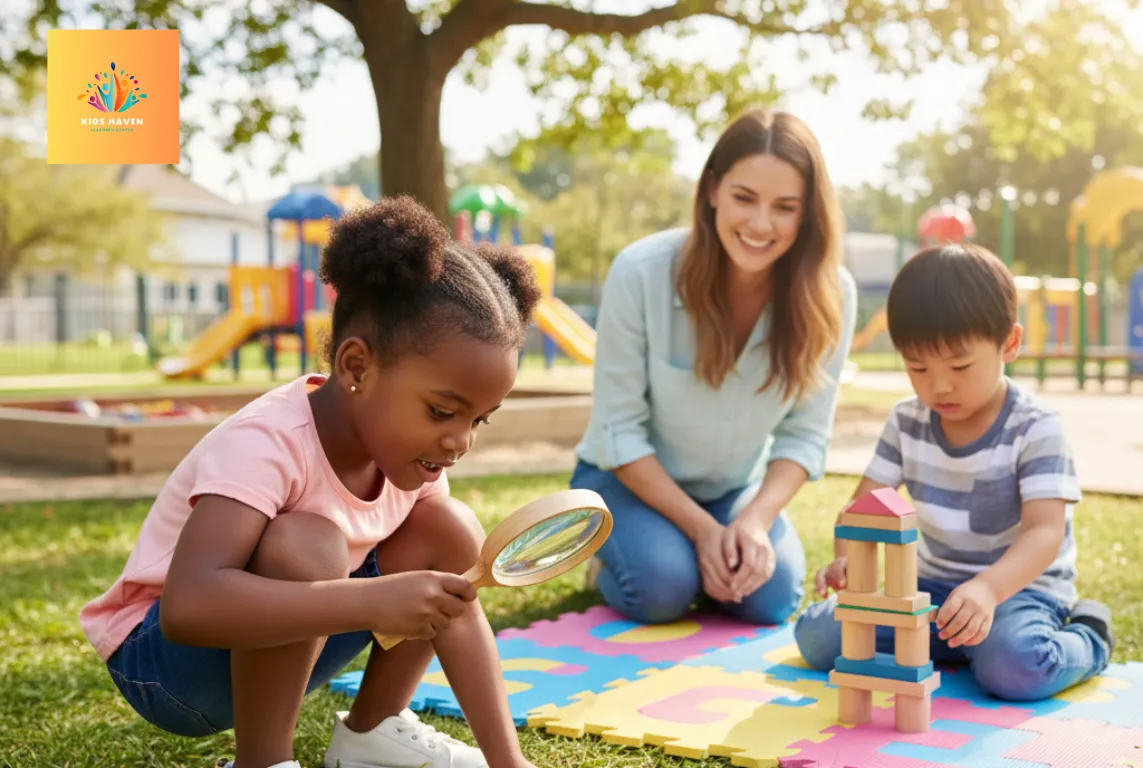
Confidence Through Discovery: Encouraging Independent Learning

Confidence Through Discovery: Encouraging Independent Learning
Confidence doesn’t appear overnight—it’s built through experience, exploration, and a few brave “I can do it!” moments along the way. For children, independence is the bridge between curiosity and confidence. When they’re given the freedom to discover, they learn not only what to think but how to think.
At Kids Haven Learning Center, we believe that discovery-driven learning is one of the most powerful ways to nurture confidence. Every child is born curious, and when that curiosity is encouraged—not corrected—it becomes the foundation for independence, resilience, and lifelong learning.
The Power of Discovery
Think back to the first time you figured something out on your own—the pride, the spark, the feeling of I did it! That’s the magic of discovery. For children, those moments happen daily when they’re given space to explore.
Independent learning doesn’t mean learning alone—it means giving children the tools and trust to find answers themselves. When a child builds a tower, solves a puzzle, or figures out why a plant needs sunlight, they experience the joy of mastering something through their own effort.
That process builds far more than knowledge—it builds self-belief.
At Kids Haven, our classrooms are designed to let children take the lead. Teachers guide rather than direct, allowing curiosity to steer the lesson. When kids ask “why,” they’re not handed an answer—they’re invited to discover it.
How Independent Learning Builds Confidence
1. Ownership of Success
When children complete a task on their own—no matter how small—they experience accomplishment. That sense of ownership fuels motivation. They begin to think, “If I figured that out, what else can I do?”
2. Resilience Through Challenge
Discovery often comes with mistakes. A tower falls, a drawing doesn’t look right, an experiment doesn’t work. But these “failures” are actually lessons in persistence. At Kids Haven, we encourage children to see mistakes as part of the process. Learning to try again builds the kind of confidence that lasts.
3. Problem-Solving and Critical Thinking
Independent learners learn how to think. They learn to observe, ask questions, test ideas, and evaluate outcomes. These are the same skills scientists, artists, and entrepreneurs use every day—and they start forming in early childhood.
4. Emotional Growth
When children are trusted to make decisions, they develop self-regulation and responsibility. Independence helps them understand their emotions—how to stay calm when frustrated and celebrate progress when successful.
Discovery in Action at Kids Haven
Every classroom at Kids Haven is a mini world of discovery.
In our science areas, children experiment with cause and effect—mixing colors, testing magnets, watching seeds grow. In creative spaces, they design their own art projects, learning to express unique ideas without a “right” or “wrong” answer.
Our teachers act as gentle guides, asking open-ended questions:
“What do you think will happen if we try this?”
“How can we make this work differently?”
“What could we change next time?”
These questions spark critical thinking and help children understand that their ideas have value. When children’s voices lead the lesson, confidence naturally follows.
How Parents Can Encourage Independent Learning at Home
The journey of self-discovery doesn’t stop at school—it thrives at home. Here are simple ways parents can nurture independence and confidence every day:
Offer choices. Let your child choose between books, activities, or snacks. Choice builds autonomy.
Celebrate effort, not just results. Praise perseverance and curiosity: “I love how you kept trying,” instead of just, “Good job!”
Give time for trial and error. Resist the urge to fix things right away. Sometimes the best learning happens when children figure it out themselves.
Ask reflective questions. “How did you do that?” or “What made you think of that?” turns small wins into big lessons.
Encourage curiosity everywhere. Turn walks, chores, or errands into opportunities to explore and wonder.
Confidence grows when children feel capable and trusted.
From Small Discoveries to Big Dreams
Every new discovery builds a child’s sense of self—each “I did it!” moment layering over the last until confidence becomes second nature.
At Kids Haven Learning Center, we believe discovery is not just part of learning—it is learning. When children are free to explore, create, and question, they don’t just gain knowledge—they gain courage.
They learn that they are capable of shaping their own understanding of the world. And that sense of power, that spark of confidence, will guide them wherever life takes them.
Because the greatest discovery a child can make is realizing what they can do on their own.